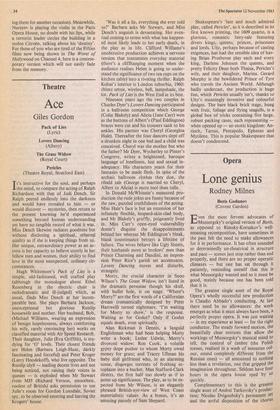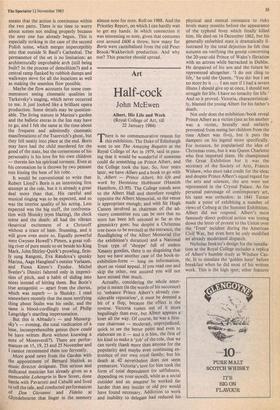Opera
Lone genius
Rodney Milnes
Even the most fervent advocates of Mussorgsky's original version of Boris, as opposed to Rimsky-Korsakov's well- meaning recomposition, have sometimes in the past felt the need to make allowances for it in performance. It has often sounded so determinedly un-theatrical in structure and pace — scenes just stop rather than end properly, and there are no proper operatic climaxes — but one has sat through it patiently, reminding oneself that this is what Mussorgsky wanted and so it must be good, mainly because one has been told that it is.
The greatest single asset of the Royal Opera's wholly successful new production is Claudio Abbado's conducting. At last there need be no allowances: the work emerges as what it must always have been, a perfectly proper opera. It was just waiting — in my experience at least — for the right conductor. The steady forward motion, the beautifully clear textures that allow the workings of Mussorgsky's musical mind to tell, the control of timbre (the Polish scenes, realised in a wash of sensuous col- our, sound completely different from the Russian ones) — all amounted to nothing less than a revelation, one that gripped the imagination throughout. Seldom have four hours in the opera house sped by so quickly. Complementary to this is the greatest single asset of Andrei Tarkovsky's produc- tion: Nicolas Dvigoubsky's permanent set and the artful disposition of the chorus
means that the action is continuous within the two parts. There is no time to worry about scenes not ending properly because the next one has already begun. This is especially striking in the case of the second Polish scene, which merges imperceptibly into that outside St Basil's Cathedral, The permanence of the set is no limitation: an architecturally improbable arch (still being built? In the process of demolition?) and a central ramp flanked by rubbish dumps and walkways serve for all the locations as well as making the seamless flow possible.
Maybe the flow accounts for some com- mentators seeing cinematic qualities in Tarkovsky's staging, which never occurred to me. It just looked like a brilliant opera production. Some details may be question- able. The living statues in Marina's garden and the balletic extras in the Inn may have to go, and I felt the same at the time about the frequent and admittedly cinematic manifestations of the Tsarevich's ghost, but they fell neatly into place at the end. Boris may have had the child murdered for the good of the state, but the cornerstone of his personality is his love for his own children — therein lies his spiritual torment. Even at his coronation he is thrown by two peasant tots kissing the hem of his robe.
It would be conventional to write that Robert Lloyd's Boris is an interesting first attempt at the role, but it is already a great deal more than that. His careful and musical singing was to be expected, and so was the interior quality of his acting. Less expected was the big stuff, the confronta- tion with Shuisky (eyes blazing), the clock scene and the death; all had the vibrant theatrical excitement of a Christoff without a trace of ham. Stunning, and it will grow even more so. Equally powerful were Gwynne Howell's Pimen, a great roll- ing river of pure music to set beside his King Mark, John Shirley-Quirk's prowling, firm- ly sung Rangoni, Eva Randova's spunky Marina, Aage Haugland's outsize Varlaam, and Fiona Kimm's Fyodor. Michel Svetlev's Dimitri faltered only in impreci- sion of pitch, and a habit of sliding into notes instead of hitting them. But Boris's true antagonist — apart from the chorus, which was superb — is Shuisky. I read somewhere recently that the most terrifying thing about Stalin was his smile, and the same is blood-curdlingly true of Philip Langridge's startling impersonation.
But this is Abbado's — and Mussorg- sky's — evening, the total vindication of a lone, incomprehensible genius (how could he have written Boris without knowing a note of Monteverdi?). There are perfor- mances on 15, 19, 23 and 25 November and I cannot recommend them too fervently.
More good news from the Garden with the appointment of Bernard Haitink as music director designate. This serious and dedicated musician has already given us a memorable Lohengrin in Bow Street, done battle with Pavarotti and Caballe and lived to tell the tale, and conducted performances of Don Giovanni and Fidelio at GlYndebourne that linger in the memory almost note for note. Roll on 1988. And the Priestley Report, on which I can hardly wait to get my hands. In which connection it was interesting to note, given that costumes cost around £600 a throw, how many for Boris were cannibalised from the old Peter Brook/Wakhevitch production. And why not? This practice should spread.















































 Previous page
Previous page